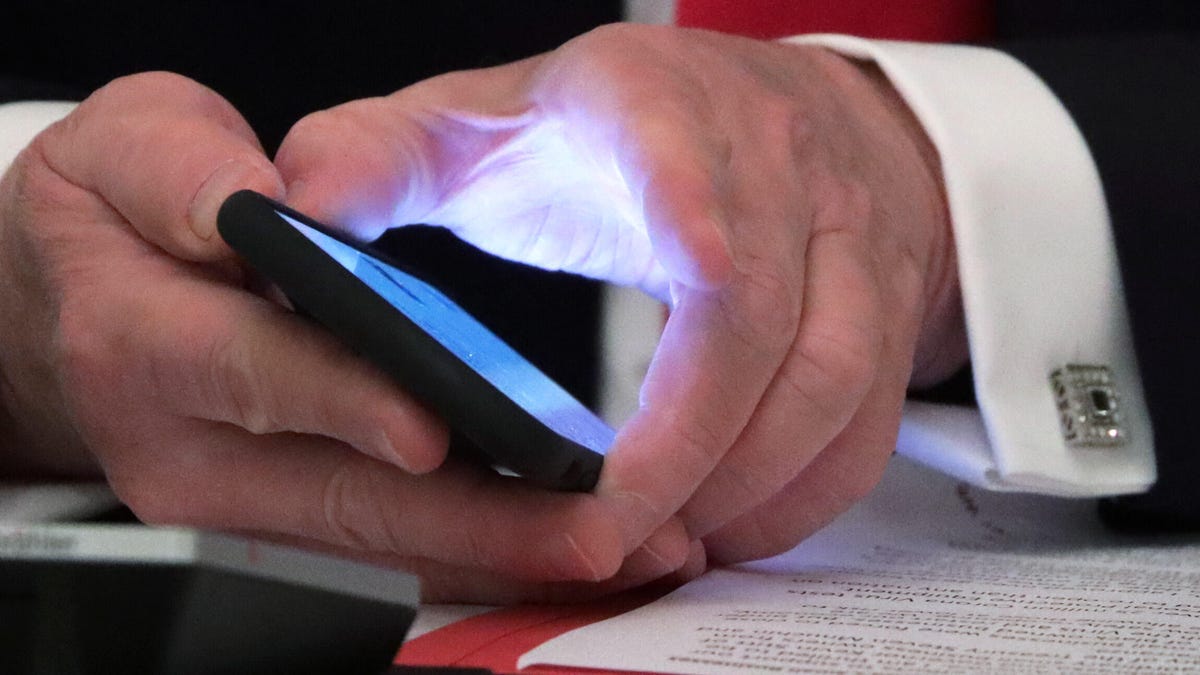Facebook reportedly prepping in case Trump tries to delegitimize election
Twitter, and Google's YouTube, are also reportedly formulating plans to deal with election trouble.

Trump is already casting doubt on the upcoming election.
US President Donald Trump has ramped up his criticism of the 2020 election over the past couple of weeks, saying the only way he'll lose is if the vote is "rigged." He's also claimed that voting by mail is unreliable, even as states prepare for expanded mail-in voting because of the coronavirus pandemic. In response, Facebook , Twitter and Google's YouTube are drawing up plans to handle efforts the president might make to undermine confidence in the results, according to a Friday report in The New York Times.
Facebook has begun working on contingency plans in case Trump questions the election's legitimacy via content on the social network, according to the Times, which cited people with knowledge of the plans and who asked to remain unnamed. Facebook is also considering how it would respond should Trump use the site to suggest the post office lost ballots or that "other groups" have interfered with the election. Facebook, which already gives users a way to see fewer political ads, has discussed a "kill switch" to shut off political advertising after Election Day, the Times reported.
Facebook declined to comment while Google didn't immediately respond a to request for comment. Trump campaign spokeswoman Samantha Zager said in a statement that "Big Tech" is attempting to obstruct the President.
"Facebook is a social media website – not the arbiter of election results, and to preemptively suggest they will silence President Trump after the election, while ignoring Democrats as they attempt to single-handedly thrust our election system into chaos, simply confirms their bias against this President," she said.
Google and Twitter confirmed to the Times that they're preparing for Election Day issues, but they didn't elaborate on plans they're considering. The White House told the paper that Trump is working to ensure election security and integrity.
A Twitter spokesman said the company partners with government, civil society and the social network's peers "to better identify, understand and mitigate threats to the public conversation, both before or after an election."
Facebook employees are worried Trump will dispute the election results, BuzzFeed News reported in early August. Facebook CEO Mark Zuckerberg told the Times that the social network is considering new rules that would address premature claims about victory during the election and other claims about the results. The company also plans on educating users that there's a "high likelihood" it'll take "days or weeks" to count up votes "and there's nothing wrong or illegitimate about that," Zuckerberg said.
The reported moves come amid rising tensions between the White House and its critics. Since his win in 2016, Trump has questioned the legitimacy of election results, alleging without evidence that millions of fraudulent votes were cast for his opponent. Now, with the election a little more than two months away, Trump is attacking mail-in votes, again without evidence, despite using a mail-in ballot himself.
Read more: The threat to vote by mail isn't fraud. It's disinformation and sabotage
Trump's critics, including his predecessor, former President Barack Obama, say Trump is attempting to sow discord and confusion ahead of the election. "This president and those in power -- those who benefit from keeping things the way they are -- they are counting on your cynicism," Obama said in a speech Wednesday at the Democratic National Convention. "They're hoping to make it as hard as possible for you to vote, and to convince you that your vote doesn't matter."
Trump has said, without evidence, that his opponents are attempting to sabotage the election.
The preparations by Facebook, Twitter and Google come as the three companies face pressure to do more to combat misinformation on their platforms.
Twitter and Facebook have different approaches to handling false claims made by politicians, including by Trump. In May, Twitter added a label to Trump's tweets for containing "potentially misleading information about voting processes," after he made false claims that mail-in ballots will be "substantially fraudulent." He also falsely stated that California will send mail-in ballots to "anyone living in the state," when only registered voters get these ballots. Clicking on the label directs Twitter users to a page that explains that fact-checkers say there isn't any evidence that mail-in ballots are linked to voter fraud. Facebook, on the other hand, doesn't send posts from Trump and other politicians to its third-party fact-checkers. Instead, the company has started labeling posts about voting and directing users to an online center that includes voting information from authoritative sources.
Trump has responded that social media companies need to be more stringently regulated to fight back against what he claims is censorship. The president signed an executive order in May that aims to curtail legal protections that shield Facebook, Twitter and other online companies from liability for content posted by their users. The Center for Democracy and Technology filed a lawsuit against the Trump administration, alleging the order violated the First Amendment, which protects free speech. Facebook, Twitter and others have repeatedly pushed back against the censorship claims.



